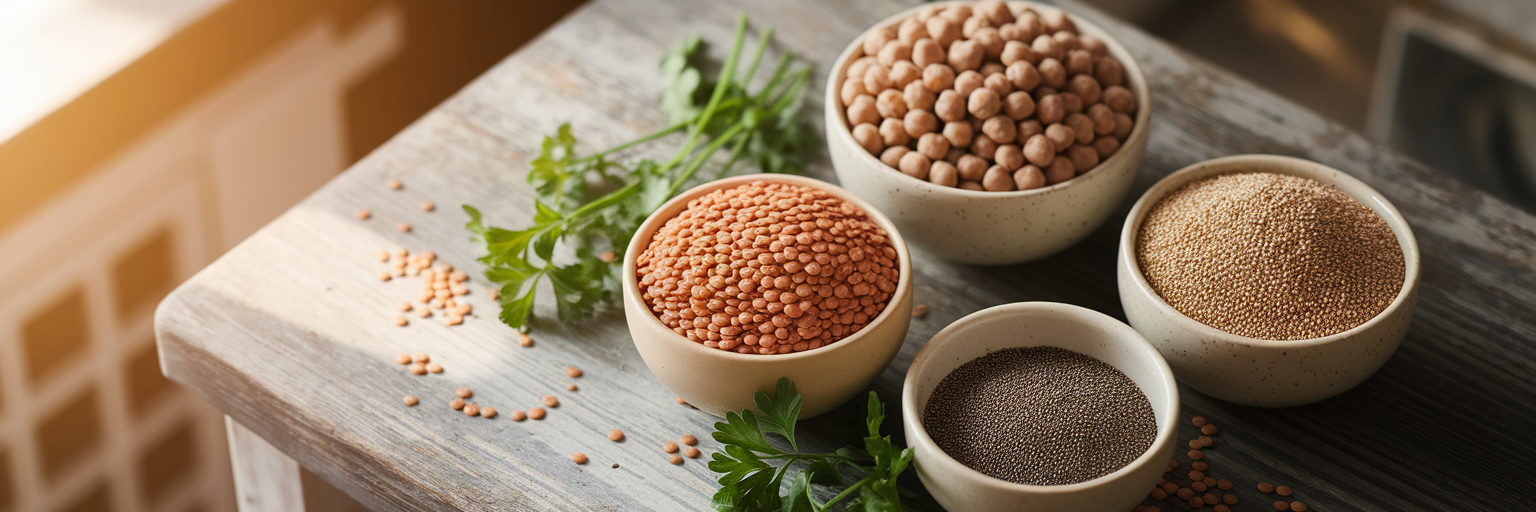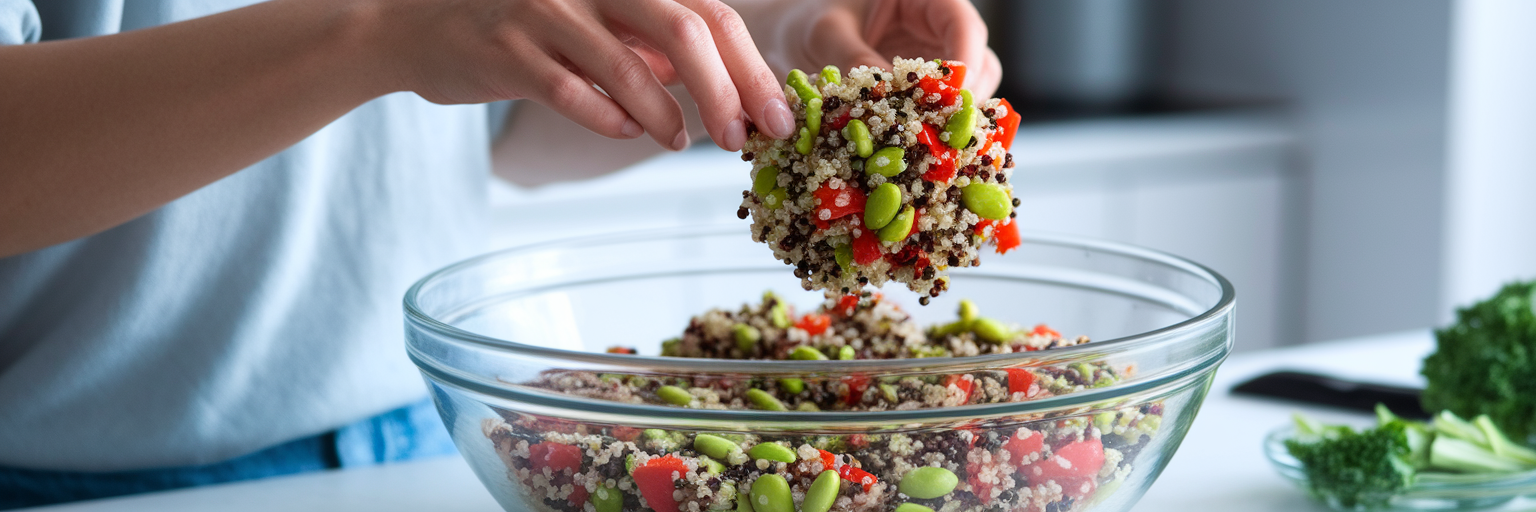We’ve all been there. You have a great workout planned, but suddenly your energy tanks, or a wave of irritability throws you off your game. For active women, these fluctuations can feel frustratingly familiar. What many don't realize is that the key to smoother energy and more stable moods is often sitting right on our plates. The secret lies in understanding vegan protein for hormonal balance.
The Essential Link Between Protein and Your Hormones
Think of your body as a sophisticated factory. Your hormones are the essential goods it produces to manage everything from your mood and energy to your menstrual cycle. And what are the raw materials needed to manufacture these goods? Amino acids, the building blocks of protein. Without a steady supply of protein, the factory’s production line slows down, leading to hormonal imbalances that can disrupt your active lifestyle.
Hormones like estrogen and progesterone regulate your monthly cycle, while insulin manages your blood sugar, providing the sustained energy you need to power through a run or a weightlifting session. When you exercise, your body’s demand for amino acids increases. This isn't just for muscle repair. Your endocrine system also needs those resources to keep producing hormones consistently. Ensuring your factory is well-stocked is a fundamental step in learning how to balance hormones naturally, creating a foundation for both physical performance and overall well-being.
The Unique Advantages of Plant-Based Proteins

Once we recognize protein's vital role, the next question is what kind to choose. Plant-based proteins offer some unique advantages for hormonal health. A well-planned plant based diet for menstrual health works because it addresses several underlying factors that can disrupt your body’s natural rhythm.
First, plant proteins are free from the added hormones and antibiotics that can be present in some animal products. This helps you avoid introducing external factors that might interfere with your own delicate endocrine system. Second, sources like beans, lentils, and chickpeas are packed with fiber. This fiber is a powerhouse for hormonal health. It supports a healthy gut, which is directly involved in metabolizing estrogen, and it helps stabilize blood sugar levels. This leads to better insulin sensitivity and more consistent energy, preventing those afternoon slumps.
Finally, a diet rich in plant foods is naturally anti-inflammatory. Chronic inflammation can disrupt hormone signaling, but the antioxidants found in plants help create a healthier internal environment. As research from the Harvard T.H. Chan School of Public Health highlights, plant-centric eating patterns are associated with numerous health benefits. By choosing plant proteins, you’re not just getting amino acids; you’re getting a full package of fiber, vitamins, and antioxidants that work together to support your body. You can explore more insights on nutrition on our blog.
Nurturing Your Menstrual Health with Vegan Foods
Focusing on specific nutrients can make a significant difference throughout your menstrual cycle. Let's look at how certain vegan foods can provide targeted support. For many women, fatigue is a major issue, especially during their period. Plant-based iron from sources like spinach, lentils, and tofu is essential for energy production. A simple tip to maximize absorption is to pair these foods with a source of vitamin C, like bell peppers, broccoli, or a squeeze of lemon juice.
If you struggle with PMS symptoms like cramps or mood swings, magnesium and zinc are your friends. You can find magnesium in pumpkin seeds, almonds, and dark chocolate, while chickpeas and hemp seeds are great sources of zinc. These minerals play a crucial role in muscle relaxation and neurotransmitter function, helping to ease discomfort and promote a sense of calm.
Then there are phytoestrogens, found in foods like soy and flaxseed. These plant compounds have a clever balancing effect. They can gently mimic estrogen when your levels are low or help block its effects when they are too high. Despite some myths, research continues to point toward the benefits of soy for hormonal health. For example, studies highlighted by the National Institutes of Health suggest soy isoflavones can be beneficial. Incorporating these foods is easy, and you can find inspiration in some of our favorite simple dishes.
Your Go-To Vegan Proteins for Hormonal Support

Stocking your pantry with the right ingredients makes it easy to support your hormones daily. Here are some of the best vegan protein sources for women, broken down into simple categories.
Legumes (Beans, Lentils, Chickpeas)
The powerful protein and fiber combination in legumes is fantastic for stabilizing blood sugar and promoting gut health. They are incredibly versatile and can be added to almost any meal.
Soy Products (Tofu, Tempeh, Edamame)
Soy is one of the few plant-based complete proteins, meaning it contains all nine essential amino acids. Tofu, tempeh, and edamame are excellent for muscle repair and provide valuable phytoestrogens.
Nuts and Seeds (Flax, Chia, Pumpkin, Hemp)
These are small but mighty. Nuts and seeds are packed with healthy fats, magnesium, and zinc. Flax and chia seeds are also great sources of omega-3 fatty acids and fiber.
Whole Grains (Quinoa, Oats, Buckwheat)
Often overlooked as a protein source, whole grains like quinoa and oats provide complex carbohydrates for sustained energy, along with a helpful dose of protein and fiber.
This table can help you visualize how to easily add these foods to your diet.
| Protein Source | Key Nutrients for Hormones | Easy Ways to Eat |
|---|---|---|
| Legumes (Lentils, Chickpeas, Beans) | Fiber, Plant-Based Iron, Protein | In soups, salads, homemade hummus, or bean burgers |
| Soy (Tofu, Tempeh, Edamame) | Complete Protein, Phytoestrogens, Iron | Scrambled tofu, marinated tempeh strips, steamed edamame snack |
| Nuts & Seeds (Flax, Chia, Pumpkin) | Omega-3s (ALA), Magnesium, Zinc | Sprinkled on oatmeal, blended into smoothies, in energy bites |
| Whole Grains (Quinoa, Oats) | Complex Carbs, Protein, Fiber | As a base for a grain bowl, in overnight oats, or as a side dish |
Smart Strategies for Your Daily Routine
Knowing what to eat is the first step. The next is knowing how to eat for optimal results. Here are a few active women nutrition tips to help you build sustainable habits.
- Practice Protein Pacing. Instead of consuming most of your protein in one large meal, aim to spread it out. Including 20-30 grams of protein with each meal helps maintain stable blood sugar and provides your body with a steady stream of amino acids for hormone production and muscle maintenance throughout the day.
- Refuel After Your Workout. The post-workout window is a key opportunity to support your hormones. Consuming a snack with both protein and carbohydrates within 60 to 90 minutes of exercise helps replenish your energy stores, aids muscle recovery, and can lower the stress hormone cortisol. A quick smoothie made with a quality powder, like our Chocolate Vegan Protein, is a convenient and effective option.
- Don't Stress About Protein Combining. The old myth that you need to eat all essential amino acids in a single meal has been debunked. Your body creates a pool of amino acids from the foods you eat throughout the day. As long as you eat a varied diet of legumes, grains, nuts, and seeds, you will get everything you need.
Considering Supplements on a Vegan Diet

A food-first approach is always best, but some nutrients are harder to obtain from plants alone. For active women on a vegan diet, a few supplements can provide important insurance.
- Vitamin B12: This is a non-negotiable. Vitamin B12 is essential for nerve function and red blood cell production, and it is not found in plant foods. A reliable supplement is a must.
- Vitamin D: Known as the "sunshine vitamin," it plays a role in mood and hormone regulation. Since many people in the US are deficient regardless of diet, a supplement is often recommended.
- Omega-3s (EPA/DHA): While plants provide ALA, our bodies are not very efficient at converting it to the anti-inflammatory powerhouses EPA and DHA. An algae-based supplement offers a direct source.
- Iron and Zinc: These are not always necessary, but some individuals may benefit. Active women, especially those with heavy cycles, might consider iron supplements for vegan women to prevent fatigue.
Before starting any new supplement, it is crucial to consult with your healthcare provider to determine what is right for your individual needs. If you and your doctor decide supplements are a good fit, you can explore the high-quality options in our full range of products.



